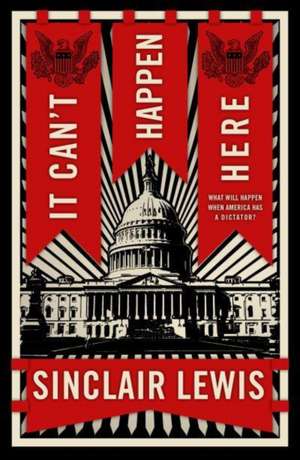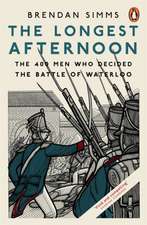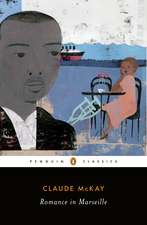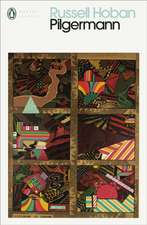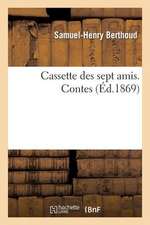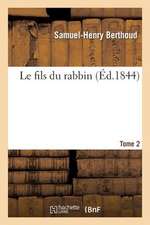It Can't Happen Here
Autor Sinclair Lewisen Limba Engleză Paperback – 15 feb 2023
| Toate formatele și edițiile | Preț | Express |
|---|---|---|
| Paperback (4) | 54.66 lei 24-30 zile | +21.63 lei 5-11 zile |
| Penguin Books – 19 ian 2017 | 54.66 lei 24-30 zile | +21.63 lei 5-11 zile |
| Signet Classics – 6 ian 2014 | 62.04 lei 3-5 săpt. | |
| Renard Press Ltd – 15 feb 2023 | 63.49 lei 3-5 săpt. | +16.38 lei 5-11 zile |
| New American Library – 30 sep 2005 | 98.97 lei 3-5 săpt. | |
| Hardback (1) | 157.26 lei 6-8 săpt. | |
| Suzeteo Enterprises – 22 sep 2022 | 157.26 lei 6-8 săpt. |
Preț: 63.49 lei
Nou
Puncte Express: 95
Preț estimativ în valută:
12.15€ • 12.72$ • 10.11£
12.15€ • 12.72$ • 10.11£
Carte disponibilă
Livrare economică 10-24 martie
Livrare express 22-28 februarie pentru 26.37 lei
Preluare comenzi: 021 569.72.76
Specificații
ISBN-13: 9781804470091
ISBN-10: 1804470090
Pagini: 416
Dimensiuni: 130 x 198 x 35 mm
Greutate: 0.4 kg
Editura: Renard Press Ltd
ISBN-10: 1804470090
Pagini: 416
Dimensiuni: 130 x 198 x 35 mm
Greutate: 0.4 kg
Editura: Renard Press Ltd
Notă biografică
The son of a country doctor, Harry Sinclair Lewis (1885–1951) was born in Sauk Centre, Minnesota. His childhood and early youth were spent in the Midwest, and later he attended Yale University, where he was editor of the literary magazine. After graduating in 1907, he worked as a reporter and in editorial positions at various newspapers, magazines, and publishing houses from the East Coast to California. He was able to give this work up after a few of his stories had appeared in magazines and his first novel, Our Mr. Wrenn (1914), had been published. Main Street (1920) was his first really successful novel, and his reputation was secured by the publication of Babbitt (1922). Lewis was awarded a Pulitzer Prize for Arrowsmith (1925) but refused to accept the honor, saying the prize was meant to go to a novel that celebrated the wholesomeness of American life, something his books did not do. He did accept, however, when in 1930 he became the first American writer to receive the Nobel Prize for Literature. During the last part of his life, he spent a great deal of time in Europe and continued to write both novels and plays. In 1950, after completing his last novel, World So Wide (1951), he intended to take an extended tour but became ill and was forced to settle in Rome, where he spent some months working on his poems before dying.
Michael Meyer, PhD, a professor of English at the University of Connecticut, previously taught at the University of North Carolina at Charlotte and the College of William and Mary. His scholarly articles have appeared in such periodicals as American Literature, Studies in the American Renaissance, and Virginia Quarterly Review. An internationally recognized authority on Henry David Thoreau, he is a former president of the Thoreau Society and the coauthor of The New Thoreau Handbook, a standard reference. His first book, Several More Lives to Live: Thoreau’s Political Reputation in America, was awarded the Ralph Henry Gabriel Prize by the American Studies Association. In addition to The Bedford Introduction to Literature, his edited volumes include Frederick Douglass: The Narrative and Selected Writings.
Michael Meyer, PhD, a professor of English at the University of Connecticut, previously taught at the University of North Carolina at Charlotte and the College of William and Mary. His scholarly articles have appeared in such periodicals as American Literature, Studies in the American Renaissance, and Virginia Quarterly Review. An internationally recognized authority on Henry David Thoreau, he is a former president of the Thoreau Society and the coauthor of The New Thoreau Handbook, a standard reference. His first book, Several More Lives to Live: Thoreau’s Political Reputation in America, was awarded the Ralph Henry Gabriel Prize by the American Studies Association. In addition to The Bedford Introduction to Literature, his edited volumes include Frederick Douglass: The Narrative and Selected Writings.
Recenzii
You
can't
read
Lewis'
novel
today
without
flashes
of
Trumpian
recognition
An eerily prescient foreshadowing of current affairs
Eighty years later the novel feels frighteningly contemporary
Not only Lewis's most important book but one of the most important books ever produced in the United States
An eerily prescient foreshadowing of current affairs
Eighty years later the novel feels frighteningly contemporary
Not only Lewis's most important book but one of the most important books ever produced in the United States
